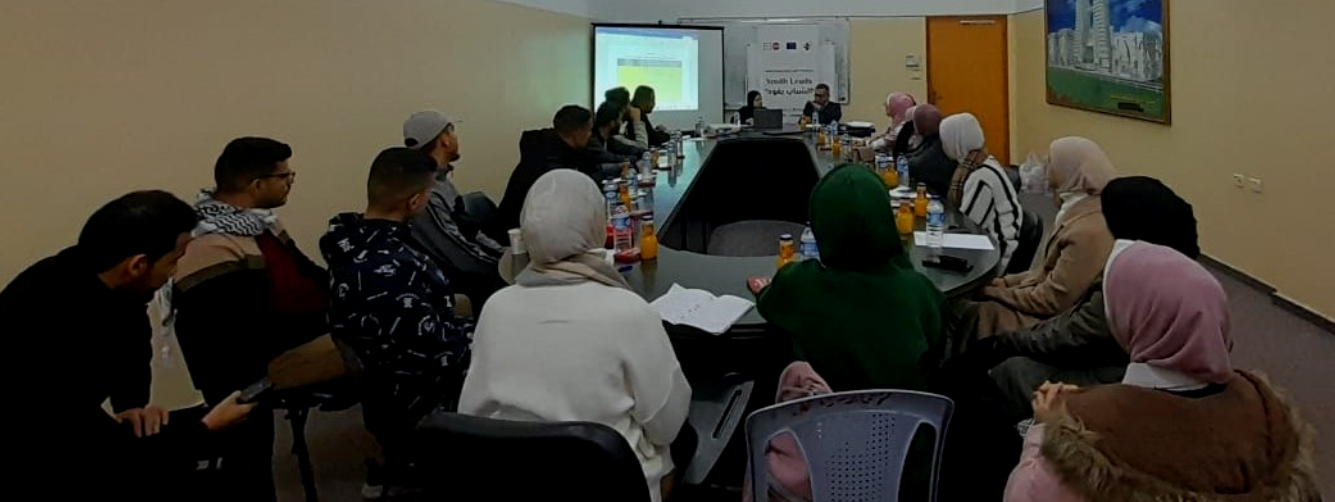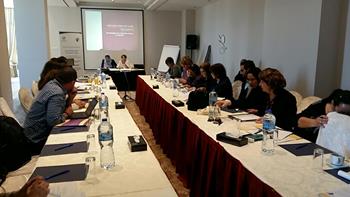
As part of its OXFAM-Novib funded project “Conflict and Fragility” MIFTAH held a roundtable meeting on the 25th of April , with international and regional organizations and diplomatic missions in Palestine to discuss the special study on the vision of Palestinian women towards the results of the Global Study of the implementation of UNSCR 1325. The study entitled “Ten strategies for tackling issues pertaining to Women, Peace and Security in Palestine “ sheds light on the gaps regarding the situation of Palestinian women under Israeli occupation, a point neglected by the Global Study, entitled “Ending Conflict, Transitional Justice and Guaranteeing Peace” which was released in 2015 on the 15th anniversary of UNSC Resolution 1325.
The meeting opened with a preview of the Global study presented by theconsultant Dr. Hadeel Qazzaz. She pointed out that the international study disregarded several pivotal issues such as: the suffering of Palestinian women under the longest occupation in history. Still she maintained, the issues broached in the study are important and can be used to the advantage of Palestinian women, adding that the most important contribution was that it covered several international experiences. Hence, Qazzaz recommended that it be used locally as educational material to increase Palestinian women’s awareness especially regarding the development of agendas pertaining to women, peace and security.
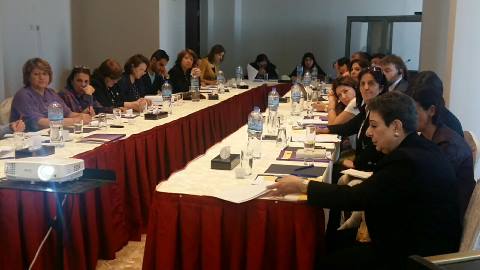
Dr. Qazzaz continued that the Global study discussed the changing nature of wars and conflicts around the world, from wars between armies to wars between non-state actors, in addition to the widespread use of advanced technology and modern media methods, which has put an additional burden on women. She said it also addressed the difference in the root causes of conflicts and the shifting concept of peace whereby signing a peace agreement does not necessarily mean an end to war. Hence, preventing a conflict before it occurs is more important in the present situation.
Nonetheless, the study noted that women were mentioned more in issues of peace and security and at the level and nature of their interventions, thus reviving their practical role. That is, this role is no longer symbolic and issues revolving conflict are more gender-sensitive.
The study pointed to influential and power actors in society, including civil society institutions, youth, media and the National Action Plan (NAP). Palestine was one of the first countries to devise an interactive and participatory national action plan. It also pointed to the importance of national statistics and monitoring in documenting violations.
The study’s recommendations reaffirmed the effective role of all partners and their rejection of militarization and conflict, also stressing on the issue of transitional justice and participation in formulating a national and international plan.
The preliminary presentation of the study was followed by commentary from the participants, who called for consideration of certain issues such as: the interference of religion in politics, the influx of weapons into conflict and war zones; the weapon-producing countries’ lack of respect towards this influx; a radical change in violence against women (such as mass rapes); the assault on women’s achievements; the increase in the number of refugees and immigrants; and the continuation of the Israeli occupation.
In the Palestinian context, several achievements by Palestinian women were mentioned. Most of these achievements revolved around participation, protection and accountability and around taking discussions to a higher level.
Regarding violence in Palestine, Dr. Qazzaz warned that violence takes place within the framework of the dominant occupation that the core solution to this violence is to end the Israeli occupation.
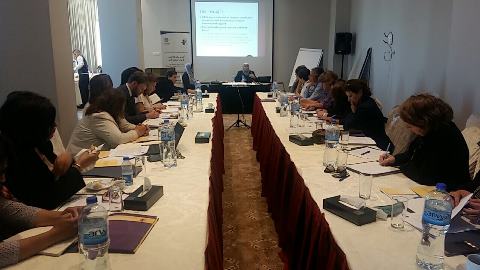
She indicated the 10 proposed strategies included in the Palestinian vision are not an alternative to the national plan but are complementary to it. This entails trilateral responsibility that includes civil society, official and international institutions. In this context, the discussion revolved around a high level of participation between the women’s coalition and the national committee for UNSC Resolution 1325 in implementing the national action plan, preparing relevant reports and the need for preserving the role of the women’s coalition as a lobbying and advocacy body that supports the development of the Palestinian women’s agenda for peace and security. Furthermore, the role of international institutions was emphasized in supporting the Palestinian demand to end the occupation, supporting the voice of Palestinian women in international arenas, human rights councils and the UN and in bolstering the efforts of the Palestinian women’s movement in its demand for protection of Palestinian women under occupation.
Discussion and recommendations
The discussions following the presentation underscored a number of issues and recommendations including:
- Women’s rights are a primarily political and legal issue; there is a need to include all women’s rights within the framework of enacted political concepts
- Addressing the concept of violence against women through the concept of peace and security necessitates a political decision and comprehensive intervention and for the international committee to shoulder its responsibilities in this regard.
- A warning against the undermining and fragmentation of states and identities in the Arab world and attempts at division such as in Syria and Iraq; also efforts to transfer external wars to Arab lands and thereby dismantle all aspects of political and social life leading to the complete overtaking of ideas and political decisions. This is at a time when international decisions in this regard are being formed according to an Israeli vision.
- Analysis of the UN rhetoric and manner in which it deals with the issue of Palestinian women. That is, the UN tries to extricate this issue from the context of the Israeli occupation, which necessitates efforts to find a formula for ending the occupation.
- The need for Palestinian discourse on the peace and security stipulation of Resolution 1325 to be interwoven with relevant international resolutions.
- Expanding the scope of confrontation with the occupation in the international arena, especially after Palestine joined a number of international agreements.
- Speaking about transitional justice as part of the Palestinian context needs research and discussions in order to comprehend its applicability within the Palestinian reality of a colonialist occupation.
- The need to condense national strategies in an comprehensive manner with the need for Palestinian data that gathers together all the information collected by civil society institutions on human rights violations.
- The adoption and linkage of Resolution 1325 to the CEDAW Convention and with international resolutions within the framework of the conflict with the occupation and holding Israel accountable for its violations in the Palestinian territories; confirming the strength of this resolution given that it is equal in legally clout to Resolution 242.
- Reaffirming the demand to implement the articles on protecting women and holding the occupation accountable and considering this to be a central national cause; identifying applicable goals regarding Resolution 1325 with the help of friendly international parties.
- Calling on European countries to recognize the State of Palestine; calling on them to honor their own decisions regarding settlements and the occupation; putting pressure on international institutions to restore their neutral and biased role towards Israel.
- Reaffirming that local institutions play a central role in impacting international organizations while the role of the later is represented in offering financial support, expertise and capacity-building support in order to allow women’s voices to be heard globally. This should be done within a framework of strategic partnership between local and international organizations.
- To request from the next Arab League ministerial meeting to focus more on Resolution 1325 and on the support the League could offer in this regard.
- A call to women leaderships to invest in youth activists who are able to shoulder responsibilities and convey the experiences of the old generation to the new.
- Identifying the levels of discourse with the various international institutions in order to secure the aspired political support from them.
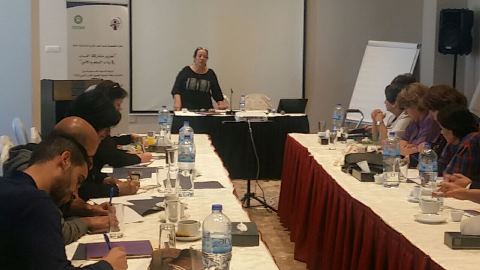
A bigger role for the Arab League
Following the study’s presentation, MIFTAH CEO Dr. Lily Feidy reiterated the importance of asking the Arab League’s next ministerial meeting to focus more on Resolution 1325 and on what support the League could offer at this level. She noted that the official stance of the Arab League in this regard was extremely weak.
Following the presentations, MIFTAH Projects Manager, Najwa Yaghi said at the Palestinian level, efforts were being made to carry out all roles, whether at the level of civil society institutions or at the level of official institutions. “We are trying to put as much effort into this as possible,” she said. “There is a lot of work that needs to be done and this needs concerted efforts at the local level, both civil and official along with international institutions working in the Palestinian territory so they can have a bigger role.”
In response to one of the calls to implement Resolution 1325 at a larger scale, Yaghi concurred, but said this needed a mechanism of coordination and networking at the local level with international organizations.
Through this meeting, MIFTAH called for unifying Palestinian women’s rhetoric and supporting the efforts of the Palestinian women’s movement by promoting their participation in political decision -making and in circles of national, regional and international dialogue.
Another meeting followed the session which included civil society institutions and Karama Network representative Ms. Amneh Hilweh The participants discussed ways of possible cooperation at the regional level. They also discussed the available options to ensure the interaction of Palestinian women’s institutions in regional and international arenas and to support Palestinian women’s peace and security agenda.










